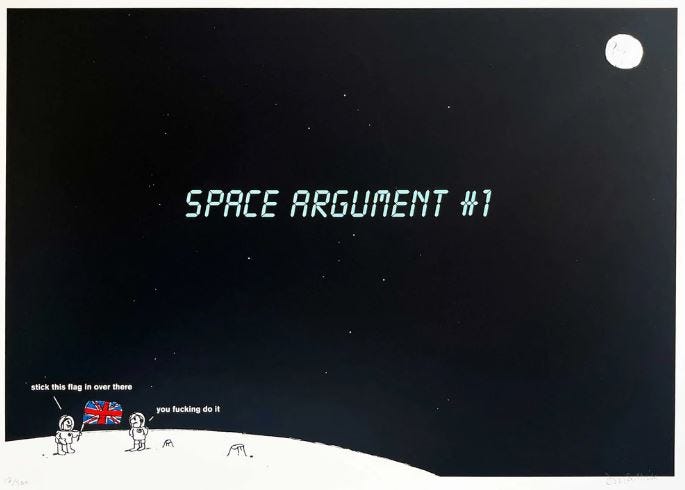"A beast that wants discourse"
There is no such ‘thing’ as A.I
“A merry little surge of electricity.” This first line of Philip K Dick’s ‘Do Androids Dream of Electric Sheep?’ might sum up the human race or our latest (perhaps final) foe/saviour: A.I – but it is not the most striking thing about the novel’s opening. Absent from Blade Runner, its fabled adaptation, is Deckard’s wife, Iran.
The book’s first pages find the unhappy science fiction couple in a timeless marital confrontation. They have a device called a Penfield which can be used to adjust their moods, but they cannot agree on how to use it. Deckard considers dialling either a stimulant to make him angry enough to win the dispute or a tranquilizer to make him forget it mattered.
“If you dial,” Iran says, “for greater venom, then I’ll dial the same. I’ll dial the maximum, and you’ll see a fight that makes every argument we’ve had seem like nothing.” Deckard concedes and goes to work, hunting machines which appear to be human, suspecting he may be one. The scene is set on January 3rd, 2021, but it was written at the end of the 1960s.
Part of its brilliance is that wherever the book is heading it takes off from timeless human ground; embodied sensations, aggravation, a reviled and desired ‘other,’ shame. Even the android’s dreams are broken, that’s how well they’re made.
The rub of A.I, at least for now, is that it seems in danger of being outrun by the pace of our opinions about it. It’s opinion about us seems less certain, although for a few days this week it had a very high opinion of me.
This would be laughable but I noticed, after a few more prompts in which I steered it towards the facts of my career, its mistaken views were no longer available. There are other people with my name (and I with theirs) who write, and although none of us wrote Hamlet, the confusion is understandable.
What was remarkable was that after my interaction, it would never be that confused again. I, on the other hand, was mortified. From my point of view this was a good mistake. I missed it, missed the moment of it and felt annoyed that I had destroyed it myself with my own enquiries.
This is what I mean by there is no such ‘thing’ as A.I. As a ‘thing’ I reflect and process, and regret. A.I moves on and yet, was never really there. Our embodied nature is indivisible from our intelligence, our intelligence is in turn a function of it. A.I is mere information and all the more pernicious for it. It will never be depressed, whereas we, like Iran Deckard may yet (and maybe should) pride ourselves on this very matter. “My schedule today lists a six-hour, self-accusatory depression,” she tells her husband, who answers, “I didn’t even know you could set it for that.”
There might be few more ambivalent ideas than national pride but I have what I think of as a certain national confidence that if, as I am proposing, enjoying disgruntlement might be the key to human integrity then Britain is well placed to lead the way. When I hear the government talk of investing in UK AI (itself sounding like some adversarial character from Lord of the Rings) I am beset with visions of this illustration from my learned former colleagues at Modern Toss .
We may have unpicked DNA and bought about the Internet but as whatever we innovate returns to subjugate it will still have to stimulate, and boy do we know how to not get things done. A vivid and appropriate example of this would be Old Street roundabout in London, or ‘Silicon Roundabout’ as the visionaries would have it. I remain struck by this critique from a young man on TikTok, who should really be considering a mayoral run.

 Tiktok failed to load.
Tiktok failed to load.Enable 3rd party cookies or use another browser
Fun as that is, it also demonstrates - I think - the great misdirect entwined with much enthusiasm for the digital – a simultaneous neglect and misrepresentation of the ‘outside’ (real) world. I have banged on here about the decline of the human and in a similar vein last week about the pace of life and the quality of our surroundings.
I live in a neighbourhood and a city that has its share of problems, but when I leave the screen and walk to the shop for something I feel as though I have taken a mental and emotional shower, and those shops are not that far away. My suggestion for those concerned about A.I (and despite the flippant sub heading, we should be) is that our best bet is to raise the status of the alternatives, which is to say the built environment, nature and social interaction, and assert some kind of ceasefire in the pharmaceutical-entertainment complex’s war against the sometimes-difficult feeling of simply being alive.
I don’t see this as a luddite posture – anything that speeds the decision-making process (cars and guns, for example) requires consideration. Because, again, we are not simply ‘intelligence’ intelligence is a facet of a much more complex and subtle system of body and mind. The issue is not the thing-in-itself of AI, but what we might want it for, what’s driving us at any moment – and this is likely to be less A.I then but A-Id, by which I mean the Id - Freud’s governing dustbin of our instinctual selves, as rich, deep and sometimes toxic as our entire history and not the kind of entity which, if you saw it at the wheel, would make you jump in for the ride.
I am not blind to the gains available or the risks of being left behind, but I think we would do well to remember in this age, the wider qualities of our mind. Not least that it is us as ‘beings’ that assert and experience meaning in real time - this is not a thing we head toward, but which we are. With our eyes so much on the future and its salesmen, we are at risk of being blinkered to this.
I have spent the last fortnight teaching and it is nigh on impossible at present to share a screen or a document without A.I sticking its oar in, offering suggestions or trying to ‘sum up’ things which I have only just begun to describe. My first thought is ‘why the hurry?’ It’s like there is something, in this race to shallow knowledge, that its sponsors wish to hide. It took a little clicking and searching, but I eventually managed to disable Microsoft’s Copilot to the point where the left-hand margins of my pages were safe from its plaintive cries to assist me. There is something very “not now, Cato” about this aspect of AI. People often cite Her as a plausible cinematic realisation of the AI future, but we might be neglecting its Pink Panther side.
Thing was, after I got rid of Copilot, I felt bad for it. It was only trying to help. Yes, I (briefly)mourned the loss of a thing reviled, a thing that never was, but I did not mourn the mourning, because that is how we know we are alive.
I should say much of my recent thinking around this issue has been shaped by Glen Slater’s book: Jung vs Borg: Finding the Deeply Human in a Posthuman Age and I should also say I am still (according to Kindle) 19 hours shy of the ending, but it feels like a very significant work which I would suggest anyone interested in these matters tries to find time for.
I am also indebted to Maria Popova’s proto-newsletter The Marginalian for bringing it to my awareness. Between Psyche and Cyborg: Carl Jung’s Legacy and the Countercultural Courage to Reclaim the Deeply Human in a Posthuman Age – The Marginalian
Another deeply human debt worth acknowledging, Jools Holland’s earlier on Radio 3 yesterday is not only alive with great music BBC Radio 3 - Earlier... with Jools Holland, Classical, blues and jazz for the weekend but also had the poet Wendy Cope as a guest. I was much moved by her poem, Flowers, as a veteran mind-changer in the romantic gesture world myself. These are other things of ours to be celebrated; hesitance, heartbreak and forgiveness. Good luck with those, A.I.
Some men never think of it.
You did. You'd come along
And say you'd nearly brought me flowers
But something had gone wrong.
The shop was closed. Or you had doubts -
The sort that minds like ours
Dream up incessantly. You thought
I might not want your flowers.
It made me smile and hug you then.
Now I can only smile.
But, Look, the flowers you nearly bought
Have lasted all this while.
I didn’t write that poem, or Hamlet, but I did write this. What it’s worth – you decide.






Love this one Michael, so much to think about. What a great poem. And I love the idea of AI as Cato. If only. Makes me think of the Cato Institute and how much better off we'd be if it wasn't a right wing think tank but a place where they did nothing but devise surprise karate attacks on French detectives.
Michael, A fine thread of words, thoughts and ideas …